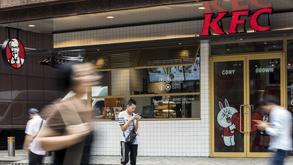 Pedestrians walk past a KFC restaurant in Shanghai, China, July 6, 2018. (SHEN QILAI / BLOOMBERG)
Pedestrians walk past a KFC restaurant in Shanghai, China, July 6, 2018. (SHEN QILAI / BLOOMBERG)
Yum China Holdings said its annual profit increased 26 percent year-on-year to $990 million, but warned of volatility due to COVID-19 uncertainties, the weak macro environment, softening consumer sentiment, and inflation risks.
Yum China, operator of chain restaurants KFC, Pizza Hut and Taco Bell on the Chinese mainland, made the revelation on Wednesday in an earnings report.
During an online media conference, Andy Yeung Ka-wai, chief financial officer of the firm, said that whether the price of menu items will be adjusted will depend on macroeconomic factors, including how inflation affects the price of commodities. The company has already hedged the price of food items to contain the cost.
READ MORE: Yum China banks on AI menus, robot servers to defy slowdown
"We have confidence in keeping commodity-price inflation in single digits.”
Yum China is gearing up investment in the supply chain, its infrastructure, as well as digital tools, and plans to expand 1,000 to 1,200 new stores this year
The total revenue of the company recorded a 19 percent growth to $9.85 billion from a year earlier, led by the operating profits and over 1,200 new-store openings.
Yum China’s operating profit surged 44 percent compared with the same period last year to $1.39 billion, mainly because of the noncash gain in the fourth quarter of last year from the remeasurement of a previously held equity interest in the Hangzhou KFC, the company said.
Same-store sales decreased 1 percent year-on-year, with a decrease of 3 percent at KFC and an increase of 7 percent at Pizza Hut.
The business was significantly affected by regional COVID-19 outbreaks and tighter public health measures like regional lockdowns as well as travel restrictions, the report said, “Same-store sales declined by more than 10 percent year-on-year in December, although sales trends recovered moderately,” the report said.
Earnings per share were $2.34, with an annual dividend of 12 US cents per share.
Yum China CEO Joey Wat Chui-yung said the retail business is “gaining momentum in capturing at-home consumption”, as digital sales occupied more than 85 percent, or $7 billion, of company sales.
The company is gearing up investment in the supply chain, its infrastructure, as well as digital tools, and plans to expand 1,000 to 1,200 new stores this year, the company said. It owned more than 11,000 restaurants on the mainland as of December.
ALSO READ: Yum China 'wins approval' for mega Hong Kong 2nd listing
Yum China also reported a 1 percent increase in revenue in the fourth quarter of 2021 compared with the same period last year. Nearly 300 stores were temporarily closed or offered only takeaway and delivery services in the fourth quarter. The number grew to more than 500 at the peak in January.
In addition to its three restaurant chains with US roots, Yum China also operates on the mainland the East Dawning, Little Sheep, Coffii & Joy, and Huang Ji Huang chains. Shares of Hong Kong-listed Yum China on Wednesday dropped by 2.96 percent to close at HK$347.4 ($44.58). The stock also trades on the New York Stock Exchange.
Contact the writer at tianyuanzhang@chinadailyhk.com


